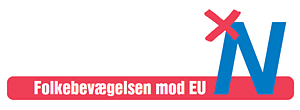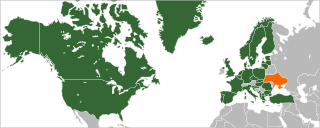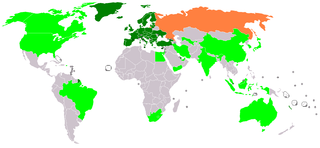Related Research Articles

The European Free Alliance (EFA) is a European political party that consists of various regionalist, separatist and ethnic minority political parties in Europe. Member parties advocate either for full political independence and sovereignty, or some form of devolution or self-governance for their country or region. The alliance has generally limited its membership to progressive parties; therefore, only a fraction of European regionalist parties are members of the EFA.

The Alliance of Liberals and Democrats for Europe Party is a European political party composed of 60 national-level liberal parties from across Europe, mainly active in the European Union. The ALDE Party is affiliated with the Liberal International and a recognised European political party, incorporated as a non-profit association under Belgian law.

Euroscepticism, also spelled as Euroskepticism or EU-scepticism, is a political position involving criticism of the European Union (EU) and European integration. It ranges from those who oppose some EU institutions and policies, and seek reform, to those who oppose EU membership and see the EU as unreformable. The opposite of Euroscepticism is known as pro-Europeanism, or European Unionism.

The North Atlantic Treaty Organization, also called the North Atlantic Alliance, is an intergovernmental military alliance between 30 member states – 28 European and two North American. Established in the aftermath of World War II, the organization implements the North Atlantic Treaty, which was signed in Washington, D.C., on 4 April 1949. NATO is a system of collective security: its independent member states agree to defend each other against attacks by third parties. During the Cold War, NATO operated as a check on the perceived threat posed by the Soviet Union. The alliance remained in place after the dissolution of the Soviet Union and has been involved in military operations in the Balkans, the Middle East, South Asia, and Africa.

In politics, lobbying, persuasion or interest representation is the act of lawfully attempting to influence the actions, policies, or decisions of government officials, most often legislators or members of regulatory agencies. Lobbying, which usually involves direct, face-to-face contact, is done by many types of people, associations and organized groups, including individuals in the private sector, corporations, fellow legislators or government officials, or advocacy groups. Lobbyists may be among a legislator's constituencies, meaning a voter or bloc of voters within their electoral district; they may engage in lobbying as a business. Professional lobbyists are people whose business is trying to influence legislation, regulation, or other government decisions, actions, or policies on behalf of a group or individual who hires them. Individuals and nonprofit organizations can also lobby as an act of volunteering or as a small part of their normal job. Governments often define and regulate organized group lobbying that has become influential.

The Group of Eight (G8) was an inter-governmental political forum from 1997 until 2014. It had formed from incorporating the country of Russia into the Group of Seven, or G7, and returned to its previous name after Russia was removed in 2014.

The economy of Austria is a developed social market economy, with the country being one of the fourteen richest in the world in terms of GDP per capita. Until the 1980s, many of Austria's largest industry firms were nationalised. In recent years, privatisation has reduced state holdings to a level comparable to other European economies. Labour movements are particularly strong in Austria, and they have a large influence on labour politics. Next to a highly developed industry, international tourism is the most important part of the national economy. The economy of Austria's average GDP is 13th growth in OECD countries, from 1992 to 2017. In Austria, 1.37% over average population growth is the strong factor.
Helsingin Sanomat, abbreviated HS and colloquially known as Hesari, is the largest subscription newspaper in Finland and the Nordic countries, owned by Sanoma. Except after certain holidays, it is published daily. Its name derives from that of the Finnish capital, Helsinki, where it is published. It is considered a newspaper of record for Finland.
The Greens/European Free Alliance (Greens/EFA) is a political group of the European Parliament composed primarily of green and regionalist political parties.

The European Green Party (EGP), sometimes referred to as European Greens, is the European political party that operates as a federation of political parties across Europe supporting green politics. The EGP cooperates with the European Free Alliance (EFA), European Pirate Party and Volt Europa to form the Greens–European Free Alliance (Greens/EFA) parliamentary group in the European parliament.
A students' union, also known by many other names, is a student organization present in many colleges, universities, and high schools. In higher education, the students' union is often accorded its own building on the campus, dedicated to social, organizational activities, representation, and academic support of the membership.

The People's Movement against the EU is a political association in Denmark against the European Union. It was founded in 1972 as a cross-party campaign platform for a 'no' vote in Denmark's referendum on EEC membership. The People's Movement was represented in the European Parliament from 1979 until 2019, when it lost its single seat in the European Parliament election.

Anna Cecilia Malmström is a Swedish politician who served as European Commissioner for Trade from 2014 to 2019. She previously served as European Commissioner for Home Affairs from 2010 to 2014 and Minister for European Union Affairs from 2006 to 2010. She was a Member of the European Parliament (MEP) from Sweden from 1999 to 2006.
Orgalim represents Europe's technology industries, comprising 770,000 companies spanning the mechanical, electrical and electronics, and metal technology branches. The industry employs about 10.97 million people in Europe, generating an annual turnover of €2,480 billion and represents one-third of the manufactured exports of the European Union. Since November 2019, Rada Rodriguez, CEO of Signify GmbH, has been the President of Orgalim.
The European Travel Commission (ETC) is an association of National Tourism Organisations (NTOs) based in Brussels. It was created in 1948 to promote Europe as a tourist destination to long-haul markets outside of Europe, originally the US and later Canada, Latin America and Asia-Pacific. ETC currently has 33 member NTOs and 14 associate members from the private industry. The association aims to raise awareness of the importance of tourism among national European authorities and the general public through sharing best practices and cooperation in market intelligence and promotion.

Relations between Canada and the European Union (EU) and its forerunners date back to the 1950s. While the relationship is primarily an economic one, there are also matters of political cooperation. Canadians also use English and French — both European languages — as official and majority languages.

Relations between Ukraine and the North Atlantic Treaty Organization (NATO) started in 1992. Ukraine applied to integrate with a NATO Membership Action Plan (MAP) in 2008. Plans for NATO membership were shelved by Ukraine following the 2010 presidential election in which Viktor Yanukovych, who preferred to keep the country non-aligned, was elected President. Amid the unrest, caused by the Euromaidan protests, Yanukovych fled Ukraine in February 2014. The interim Yatseniuk Government which came to power initially said, with reference to the country's non-aligned status, that it had no plans to join NATO. However, following the Russian military invasion in Ukraine and parliamentary elections in October 2014, the new government made joining NATO a priority. On 21 February 2019, the Constitution of Ukraine was amended, the norms on the strategic course of Ukraine for membership in the European Union and NATO are enshrined in the preamble of the Basic Law, three articles and transitional provisions.

ETSI is an independent, not-for-profit, standardization organization in the field of information and communications. ETSI supports the development and testing of global technical standards for ICT-enabled systems, applications and services.
Advocacy groups, also known as interest groups, special interest groups, lobbying groups or pressure groups use various forms of advocacy in order to influence public opinion and ultimately policy. They play an important role in the development of political and social systems.
ESBA may refer to:
References
- "ESBA, A New European Association for Small Firms". European Report. 27 January 1999. HighBeam
- "European Small Business Alliance of Small and Medium Independent Enterprises - ESBA" in The European Union Encyclopedia and Directory 1999. Third Edition. Europa Publications Limited. 1999. ISBN 1 85743 056 5. Page 389.
- Kevin Brown. "Smaller businesses fight for less EU regulation". Financial Times. 23 January 1999. p 6 (UK edition).